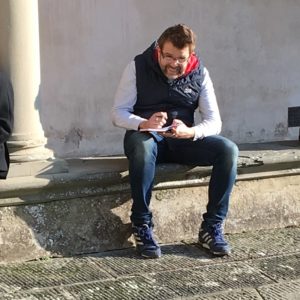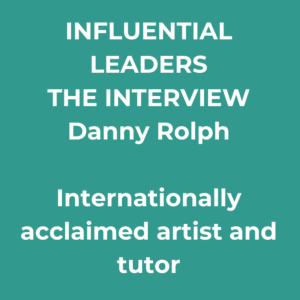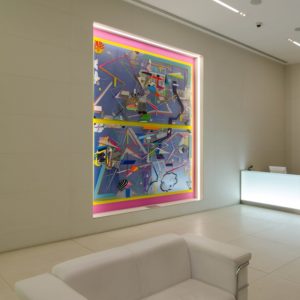Danny Rolph
Internationally acclaimed artist and tutor for over 25 years, who’s favourite DJ is Tony Blackburn.
Born and bred in the heart of London, Danny has been an artist since the tender age of just 15 years old. He has exhibited his paintings all over the world. His work is represented in many private and public collections including the Tate Gallery in London, the Metropolitan Museum of Art in New York, Duke and Duchess of Westminster and Goldman Sachs alongside winning a host of awards.
As well as sustaining a hugely successful career as a self-employed artist for over 25 years, Danny also spends his time tutoring and mentoring upcoming artists, helping them to navigate their way in the art industry.
Most recently Danny has been considering the character traits needed by recent Fine Art graduates to make it in the industry, and how this approach can be applied in other areas of business leadership.
We were lucky enough to catch up with Danny in his London studio.
Welcome to the Leadership Interview, Danny.
How do you start your day?
I turn on BBC Radio 4, listen to the Today show, eat breakfast, jump on the bike then ride 12-miles to the studio. Once I’m there the radio goes on (again!). I usually start working on some watercolours… then it’s a look at the newspaper, maybe a crossword and back to work.
What was your first job, and what is the worst job you’ve ever done?
My first job was in a video shop – which is a thing of the past now! It was by Mansion House station in the City of London near to where I grew up. I was sixteen years old. It was great because I loved watching music videos on the screens in the shop all day. It was at the height of the video revolution. The video shop experience also exposed me to the world of film, especially Stanley Kubrick and Francis Ford Coppola.
My worst job – Smithfield Meat Market, it lasted a week as a 16-year-old boy; I wasn’t physically cut out for it. I loved the people that worked there though, all very funny.
I was also a milkman for two days – my great schoolfriend and I had the full uniform on and couldn’t stop laughing. Afterwards I felt so bad that we’d been hysterical in front of this guy that had worked as a milkman for 20 or more years – but he just took it all in his stride.
What advice would you give to others about furthering their careers?
I tutor quite a lot of artists just starting out in the industry – I want to provide help – this comes from a genuine passion. Recently I’ve been thinking about the character traits you really need as an artist to survive in the world. These traits have little to do with artistic talent – but everything to do with your character and ability to communicate a vision and how to keep working towards that vision no matter what knock backs you might experience.
I’ve identified five key traits: Vision, Integrity, Resilience, Understanding and a healthy dose of Stubbornness. Together they make the acronym ‘VIRUS’ – which at first didn’t sound too healthy! But as a word it’s both attractive and subversive – and actually – like all viruses it contains the antidote – the solution to making something better.
These traits aren’t just applicable to the world of Art – any business leader – start-up or seasoned – would benefit from nurturing these traits to sustain a business whilst not compromising their overall vision. I’m looking forward to working with business leaders across different industries to share the VIRUS and support their business growth.
Who inspires you and why?
I can’t even begin to answer this one. Other artists, musicians, poets and writers – I’m a cultural magpie. It’s so hard to say one person or genre. These days you can also learn so much from YouTube – I’m interested in literally everything that has potential, make of that what you will!
Do you think a talent to lead is nature or nurture?
Good question. I think it’s in you – so I think it’s nature. But it depends what you mean by ‘leading’ – hardly any of us actually ‘lead’.
Even Julius Caesar in Ancient Rome had to rely on the Senate. I understand the need for figure heads – but I have a healthy distrust of the need for titles and accolades. I believe you learn and lead through open conversation – this attribute is not about being named as a leader per se – I want everyone to feel equal and a participant. It’s important to listen to diverse opinions before coming to any conclusion.
How can a leader fail? Do you have a personal example?
A leader fails in wanting accolades. A leader fails in believing too much in what they say – by closing the doors around you when you should be opening windows to let the air in. When you hear about great successes, they are often individuals that have spoken to many people and taken on other advice…
What are your greatest strengths and weaknesses?
My strengths – resilience, belief that I can communicate either visually or verbally with another in many different ways. I also completely believe in my ability to embrace my doubt. Doubt is key for me to embrace the next step.
My weaknesses – I get frustrated by people that don’t seem interested in teaching but are working in teaching roles. I’m not judgemental though – live and let live. It’s good to have friends and family around to rib you about your weaknesses, as it’s sometimes hard to see your own. Every day at work in the studio I get blocks, but I break through them.
What do you find most challenging about being a leader?
As a mentor, whatever artists or students come to me with I’ll be as honest as possible. I’ll also challenge them. But in Art it’s easy to find problems – their approach, outcomes, creativity, etc. The most important and challenging thing is to find their strengths – and have the ability to enable a conversation, even if the subject matter is incredibly familiar – it’s important to keep the conversation going. The subject may feel clichéd, but I try to remember that for the student it could be the first time they’ve thought about a particular issue – my challenge is to keep them thinking around the topic. I look at the strengths and encourage them to develop their own critical faculties in relation to what they have achieved.
What are you most proud of?
Another good question. It’s weird in relation to Art, you are never entirely happy with what you’ve achieved – if you were, you’d never make another work. Happiness is in discovering something you’ve not discovered before. There’s a word in Sanskrit called Klesha which means “loss of innocence through the acquisition of knowledge”. Artistically it’s very important not to lose your curiosity or innocence.
What’s your biggest self-indulgence?
Apart from art materials – vinyl LP’s and books. I have a record collection of around 2,000. I recently DJ-ed at a private festival at Lizard in Cornwall. It was a 21st birthday party – 12 till 3am – it was hard to stay up that late! When they asked for my playlist I just pointed at my box! I’m old school – no playlist – I just read the room.
One of my favourite DJ’s is Tony Blackburn – he’s so funny – the only DJ I’ve ever called into a show for! Mind you, what we discussed is probably the subject of a separate interview…!
You can learn more about Danny on his website at: http://dannyrolph.com/
#dannyrolph #influentialleader #leadership #freelanceartist



